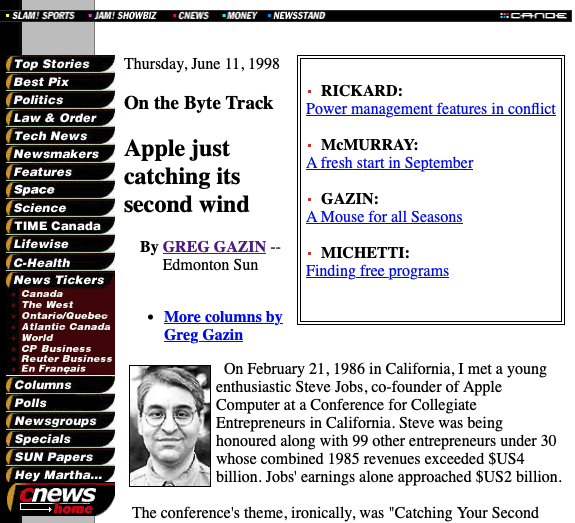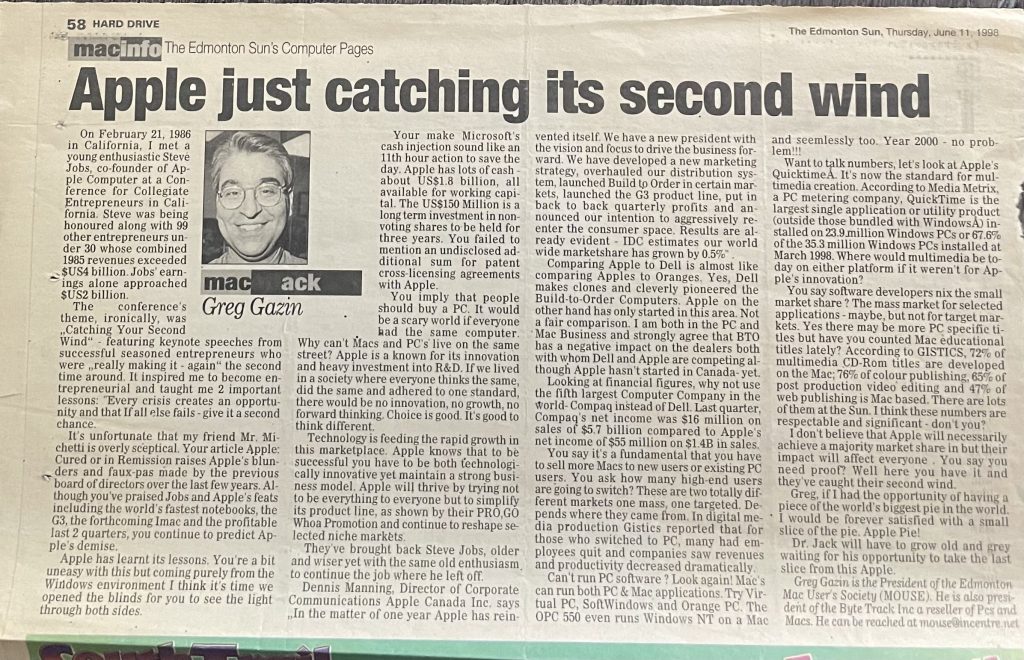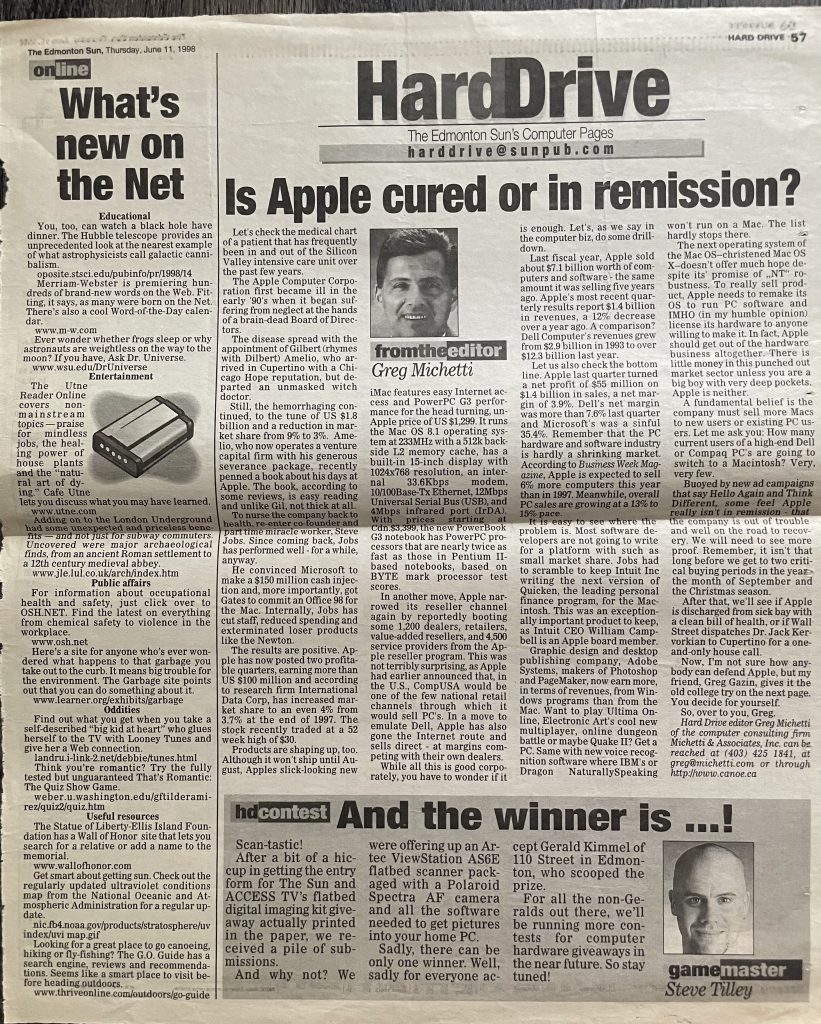
Apple resurgence a testament to resilience, technological breakthroughs and the power of second winds
On June 5, 2023, Apple’s stock reached an unprecedented pinnacle, trading at a record-breaking US$184.95. It can be argued that the company has experienced a remarkable resurgence, akin to rising from the ashes, when compared to June 11, 1998 – exactly 25 years ago today.
On that noteworthy day, the stock price of Apple Computer Inc. (which subsequently became Apple Inc. in 2007) stood at a meagre US$0.21 after accounting for stock splits. This was an era preceding the advent of transformative innovations such as the iPod, the iPhone, and the App Store.
My unwavering – some would say fanatical – admiration for Apple was undeniable. Approximately one week prior, my editor at the Edmonton Sun had graciously shared an advance copy of an article authored by colleague Greg Michetti, a fervent advocate of personal computers. Greg had requested my contribution as a rebuttal to his article, with both articles slated for simultaneous publication in the Edmonton Sun.
With the introduction of the Apple Vision Pro, I found it intriguing to reflect upon the discussions about Apple’s future at that time.

Here is an edited version of the article, which appeared on Thursday, June 11, 1998:
APPLE JUST CATCHING ITS SECOND WIND
On February 21, 1986, in California, I met a young enthusiastic Steve Jobs, co-founder of Apple Computer, at a Conference for Collegiate Entrepreneurs. Steve was being honoured along with 99 other entrepreneurs under 30 with combined 1985 revenues exceeding US$4 billion. Jobs’ earnings alone approached US$2 billion.
The conference’s theme, ironically, was “Catching Your Second Wind,” – featuring keynote speeches from successful seasoned entrepreneurs who were “really making it – again” the second time around. It inspired me to become entrepreneurial and taught me two important lessons: “Every crisis creates an opportunity, and if all else fails – give it a second chance.
Greg, you are being overly skeptical in your article. You focus on Apple’s blunders and faux-pas made by the previous board of directors over previous years. Although you praised Jobs and Apple’s feats, including the world’s fastest notebooks, the G3, the forthcoming iMac and the profitable last two quarters, you continue to predict Apple’s demise.
You fail to realize, Greg, that Apple has learnt its lessons.
You make Microsoft’s cash injection sound like an 11th-hour action to save the day. Apple has lots of cash – about US$1.8 billion, all available for working capital. The US$150 million from Microsoft is a long-term investment in non-voting shares to be held for three years. You failed to mention an undisclosed additional sum for patent cross-licensing agreements with Apple.
You imply that people should buy a PC. It would be a scary world if everyone had the same computer. Why can’t Macs and PCs live on the same street? Apple is known for its innovation and heavy investment in R&D. If we lived in a society where everyone thought the same, did the same, and adhered to one standard, there would be no innovation, no growth, no forward thinking. Choice is good. It’s good to think different.
Technology is feeding the rapid growth in today’s world. Apple knows that, to be successful, you must be both technologically innovative and maintain a strong business model. Apple will thrive not by trying to be everything to everyone but by simplifying its product line and continuing to reshape selected niche markets.
They’ve brought back Steve Jobs, older and wiser yet with the same old enthusiasm to continue the job where he left off.
Dennis Manning, Director of Corporate Communications Apple Canada Inc., says, “In the matter of one year, Apple has reinvented itself. We have a new president with the vision and focus to drive the business forward. We have developed a new marketing strategy, overhauled our distribution system, launched Build to Order in certain markets, launched the G3 product line, put in back-to-back quarterly profits and announced our intention to aggressively re-enter the consumer space. Results are already evident – IDC estimates our worldwide market share has grown by 0.5 per cent.”
Comparing Apple to Dell, as you do, is almost like comparing apples to oranges. Yes, Dell makes clones and cleverly pioneered the Build-to-Order (BTO) Computers. Apple, on the other hand, has only started in this area. Not a fair comparison. I am both in the PC and Mac business and strongly agree that BTO negatively impacts the dealers with whom Dell and Apple are competing, although Apple hasn’t started in Canada – yet.

Looking at financial figures, why not use the fifth largest computer company in the world – Compaq – instead of Dell? Last quarter, Compaq’s net income was US$16 million on sales of US$5.7 billion compared to Apple’s net income of US$55 million on US$1.4 billion in sales.O
You say it’s fundamental that you have to sell more Macs to new users or existing PC users. You ask how many high-end users are going to switch. These are two different markets: one mass, one targeted. In digital media production, Gistics reported that many employees had quit those companies that switched to PC, with company revenues and productivity decreasing dramatically.
You maintain that a Mac can’t run PC software. Look again! Macs can run both PC and Mac applications. Try Virtual PC, SoftWindows and Orange PC. The OPC 550 even runs Windows NT on a Mac, and seamlessly too.
Want to talk numbers? Let’s look at Apple’s QuickTime. It’s now the standard for multimedia creation. According to Media Metrix, a PC metering company, QuickTime is the largest single application or utility product (outside those bundled with Windows) installed on 23.9 million Windows PCs or 67.6 per cent of the 35.3 million Windows PCs installed as of March 1998. Where would multimedia be today on either platform if it weren’t for Apple’s innovation?
You say software developers nix the small market share? Maybe for the mass market for selected applications, but not for target markets. Yes, there may be more PC-specific titles, but have you counted Mac educational titles lately? According to GISTICS, 72 per cent of multimedia CD-ROM titles are developed on the Mac; 76 per cent of colour publishing, 65 per cent of post-production video editing and 47 per cent of web publishing are Mac based. There are lots of them at the Edmonton Sun. I think these numbers are respectable and significant. Don’t you?
I don’t believe Apple will necessarily achieve a majority market share, but its impact will affect everyone. You say you need proof? Well, here you have it, and now they’ve caught their second wind.
End of the original article.
Looking back, I wish I had purchased Apple shares back in 1998.
Today, Apple remains one of the most valuable companies in the world, with a market capitalization of about US$2.85 trillion or about $3.8 trillion loonies.
So, the next time you gaze at your Apple device or hear news about the company, remember the story of its near demise and remarkable revival. It’s a tale of perseverance, visionary leadership, innovation and the power of second chances.
| USD | Mar 2023 | June 1998 |
| Revenue | $94.84B | $1.40B |
| Net income | $24.16B | $55.0M |
| Cash on | $55.872B | $1.8B |
| Share Price | $184.95 | $0.21 adjusted for splits |
Source: Apple Inc. & Macrotrends
Here is the original article as it first appeared on-line at Canoe.ca.
The syndicated edition of the article appears at Troy Media and 32 affiliated syndicated sites. Podcasts also appear at either Toastcaster.com or Toastmasters Podcast.com.
Greg Gazin, also known as the Gadget Guy and Gadget Greg, is a syndicated veteran tech columnist, communication, leadership and technology speaker, facilitator, blogger, podcaster and author. Reach him @gadgetgreg or at GadgetGuy.ca.


Speak Your Mind